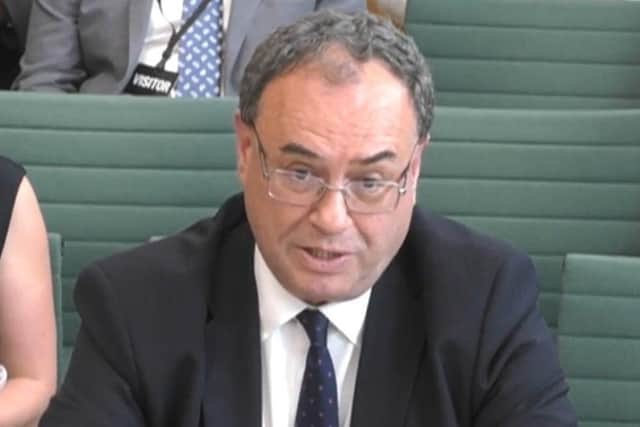Food prices and jobless warning
and live on Freeview channel 276
Andrew Bailey said he felt “helpless” as he defended the Bank of England’s monetary policy despite households being battered by soaring inflation.
Mr Bailey told MPs at the Treasury Select Committee yesterday that UK consumer demand will be impacted by current inflation, which is the highest in 30 years, and this is expected to cause higher unemployment.
Advertisement
Hide AdAdvertisement
Hide AdThe Office for National Statistics recorded inflation at 7% in March and later this week is expected to unveil over 8% inflation for last month.


The Bank of England has said inflation is likely to peak at 10.25% during the final quarter of 2022.
“The main driver of inflation and what brings it down is the very big, real income shock which is coming from outside forces and, particularly, energy prices and global goods prices,” Mr Bailey told MPs.
“That will have an impact on domestic demand and it will dampen activity, and I’m afraid it looks like it will increase unemployment.”
Advertisement
Hide AdAdvertisement
Hide AdHe told the committee that “we are walking a very narrow path” between surging inflation and risks to growth.
The governor stressed that the war in Ukraine has resulted in an unpredictable jump in inflation, highlighting that there is still a “major worry” over further rises in food prices due to the conflict.
“The Ukrainian finance minister said that there is food in store but they can’t get it out,” he told MPs.
“While he was optimistic about crop planting, as a major supplier of wheat and cooking oil, he said we have no way of shipping it out and that is getting worse.
Advertisement
Hide AdAdvertisement
Hide Ad“It is a major worry for this country and a major worry for the developing world.
“Sorry for being apocalyptic but that is a major concern.”
In March, UK food inflation increased by 5.9% and is expected to accelerate in the coming months.
Michael Saunders, who sits on the bank’s monetary policy committee, said he believes tighter monetary policy would have done little to alter the current rate of inflation.
Mr Bailey also told MPs that he does not think the bank “could have done anything differently” to avoid sharp price rises.